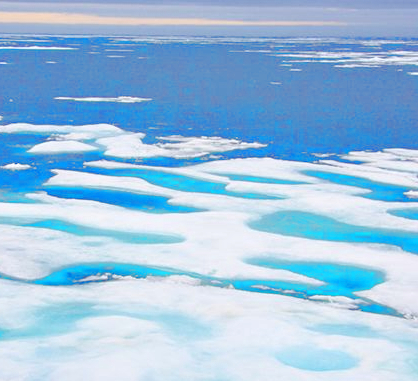New low for Arctic ice
 New data shows Arctic ice has hit a new record low.
New data shows Arctic ice has hit a new record low.
Record extreme events seen during 2019 in the Mediterranean Sea and average ice thickness reducing by 90 per cent in the Barents Sea are among the findings of the annual ‘Copernicus Ocean State Report’, published in the Journal of Operational Oceanography.
This year’s review (focused on results from 2019) shows unprecedented levels of impact of climate change.
The warming of the Arctic Ocean is contributing to an estimated near 4 per cent of the entire global ocean warming.
A near 90 per cent reduction of average sea ice thickness has been witnessed in the Barents Sea (a small part of the Arctic), which has led to a decrease in sea ice import from the polar basin.
In the North Sea, extreme variability from cold-spells and marine heatwaves has been linked to reported changes in catches of sole, European lobster, sea bass, red mullet, and edible crabs.
In the Mediterranean Sea, there were four consecutive record flooding events in Venice (November 2019), and higher-than-average wave heights in the southern Mediterranean (in 2019).
Globally, average sea temperatures went up at a rate of 0.015 celsius per year from 1993-2019, and oxygen levels (oxygen inventory) in the Black Sea dropped at a rate of -0.16 mol/m2/year from 1955-2019.
Summarising the international situation of the ocean, report chair Dr Karina von Schuckmann states a need for ongoing improved development and provision of state-of-the art ocean knowledge and products, in addition to regular monitoring through the EU-funded Copernicus.
“Climate change, pollution, and overexploitation have placed unprecedented pressures on the ocean requiring the urgent need for sustainable measures for governance, adaptation, and management in order to secure the various life support roles the ocean offers for human well-being,” she says.
“Scientifically-sound knowledge derived from high-quality ocean products and delivered by ocean services is critical to stimulate transformative change. Considering the ocean as a fundamental factor in the Earth system and embracing the multidimensional and interconnected nature of the ocean is the bedrock for a sustainable future.”
Overall, the 185-page testimony provides a comprehensive, state-of-the-art, scientific report on the current conditions, natural variations, and ongoing changes in the global ocean and European regional seas.
Other key findings include:
-
A new satellite-derived plankton-to-fish index in support of ocean management and fisheries is presented
-
A new indicator method in support of eutrophication monitoring has been introduced, which is used by EuroStat (SDG 14.1)
-
Development of additional attributes for Indian Ocean Dipole monitoring, which reported strong events in 1997 and 2019 linked to droughts and extreme precipitation
-
An Invasive lionfish migration into the Ionian Sea in 2019
-
In the Baltic Sea, there were unusual 2019 sea level and extreme wave conditions in the Gulf of Bothnia








 Print
Print